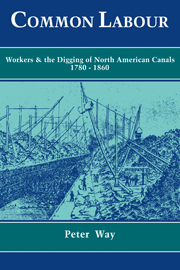Book contents
- Frontmatter
- Contents
- List of tables
- Acknowledgements
- Chronology of construction for main canals
- Abbreviations
- Map: Main canals of the North American Canal Era, 1780–1860
- Introduction
- 1 Early canals, 1780–1812
- 2 “As low as labor and capital can afford”: the contracting system, 1817–1840
- 3 “Human labor, physical and intelligent”
- 4 Payment “fit for labouring people”
- 5 The greatest quantity of labour
- 6 “Canawlers and citizens”
- 7 “Guerilla war”: labour conflict in the 1830s
- 8 “This new order of things”: the 1840s–1850s
- Conclusion
- Appendix 1 Tables 1–16
- Appendix 2 Tables 17–18
- Index
Introduction
Published online by Cambridge University Press: 03 November 2009
- Frontmatter
- Contents
- List of tables
- Acknowledgements
- Chronology of construction for main canals
- Abbreviations
- Map: Main canals of the North American Canal Era, 1780–1860
- Introduction
- 1 Early canals, 1780–1812
- 2 “As low as labor and capital can afford”: the contracting system, 1817–1840
- 3 “Human labor, physical and intelligent”
- 4 Payment “fit for labouring people”
- 5 The greatest quantity of labour
- 6 “Canawlers and citizens”
- 7 “Guerilla war”: labour conflict in the 1830s
- 8 “This new order of things”: the 1840s–1850s
- Conclusion
- Appendix 1 Tables 1–16
- Appendix 2 Tables 17–18
- Index
Summary
In accordance with the good character you gave the gentleman in Youghal, I expect him, if he undertakes to write the history of that town, not to be prejudiced for or against either the Gael or the Gall, nor to praise or discredit unwarrentedly, nor to take sides against either rich or poor, but to give an account of all – good and bad – as they deserve, so far as he is able to ascertain the facts. Any historian who does not hold to this rule in his writing deserves not the name of historian but that of idle roller, a prating liar who makes a fool of others as well as of himself.
William Fee was a young Irishman indentured to the Potomac Company of Virginia. Disliking the demanding work of lock making and river improvement, or perhaps resenting his bondage, he ran away from the canal in 1786, only to be recaptured. The company shaved off Fee's eyebrows and sheared two streaks in his hair, intersecting to form a cross, as punishment and to mark him as a miscreant. Francis Murray, another absconding servant who lost his eyebrows when apprehended, also had an iron collar forged around his neck, the mark of the incorrigible fugitive. Company policy was that shaving should continue every week “until their behaviour evinces that they are brought to a sense of their duty.” Many of the Potomac's servants, bought from European ships in Philadelphia and Baltimore, refused to be complaisant beasts of burden, and absconding was rife on company works, as it was wherever indentured servitude was practiced.
- Type
- Chapter
- Information
- Common LabourWorkers and the Digging of North American Canals 1780–1860, pp. 1 - 17Publisher: Cambridge University PressPrint publication year: 1993



